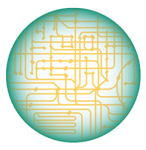Designing Novel Enzymes for Complete Degradation of Recalcitrant Polyamides
Authors:
Amandeep Sangha1* ([email protected]), Elise Span1* ([email protected]), James Leinas1, Jacob Bale1, Christopher Voigt2, and Alexandre Zanghellini1* ([email protected])
Institutions:
1Arzeda Corporation; and 2Massachusetts Institute of Technology
Goals
The project objectives are to (1) design enzymes capable of complete depolymerization of nylon 6 and nylon 66 and (2) engineer bacterial strains able to metabolize the degradation products to higher-value sustainable materials.
Abstract
As of 2015, a total of 6.3 billion tons of plastic waste had been generated globally. It is estimated that only 9% of this total has been recycled, while 12% has been incinerated to recover energy values, and the remainder has entered landfills. New technologies are needed to address this ever-growing problem. An alternative approach, harnessing the power of biology to not just depolymerize plastics back to their monomer precursors but convert them into higher-value products, offers stronger economic incentives and in turn would be expected to drive more rapid and widespread adoption. Toward that end, this work focuses on combining cutting-edge computational protein design and synthetic biology to address the challenge of complete biodegradation and upcycling of the recalcitrant polymers nylon 6 and nylon 66.
Although natural enzymes have been shown to be capable of degrading amorphous portions of polyamides such as nylon 6 and nylon 66, complete enzymatic degradation has not been demonstrated. Researchers hypothesize this to be due in large part to a lack of natural enzymes able to efficiently catalyze degradation of the crystalline portion of the polymer. Researchers are computationally designing enzymes to alleviate this limitation by introducing and optimizing polyamide hydrolysis activity in scaffolds with open active sites. In conjunction, researchers are screening and engineering bacterial strains able to metabolize nylon 6 and nylon 66 degradation byproducts directly into central metabolism. Such platform strains can be used to produce a wide variety of fermentation products from central metabolites. Integration of nylon 6 and nylon 66 depolymerizing enzymes into these engineered hosts will provide a novel, elegant, and cost-effective consolidated fermentation process for nylon upcycling to higher-value sustainable materials.
Funding Information
This material is based upon work supported by the U.S. Department of Energy, Office of Science, Office of Biological and Environmental Research, Genomic Science Program under Award Number DE-SC0022077.
